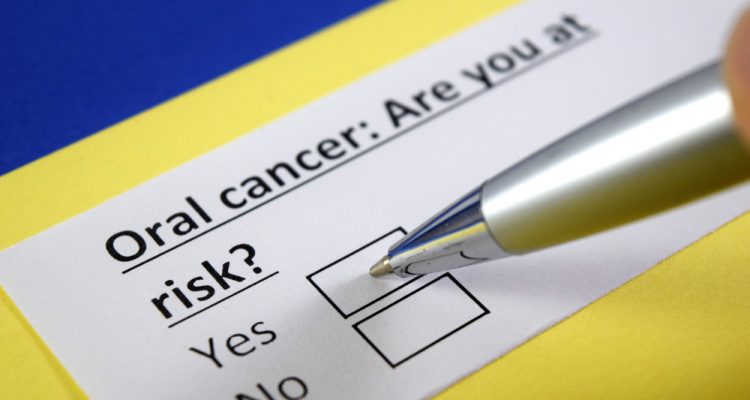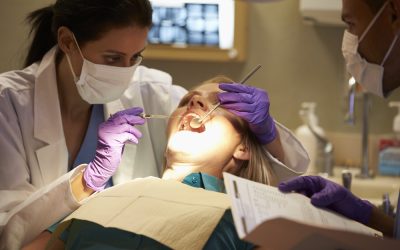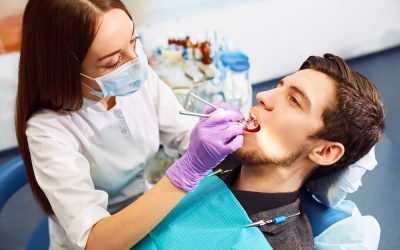In 2020, an estimated 53,260 people will develop oral cavity (mouth) and oropharyngeal (throat) cancer, according to statistics from the American Cancer Society. Cancer can form in any area that makes up the oral cavity – lips, gums, tongue, cheek tissues, roof and floor of mouth – as well as the sinuses, tonsils, and throat.
Oral cancers are part of the larger category of head and neck cancers and many cancers that begin in the oral cavity spread to the head and neck. Early detection and treatment is critical for oral cancers because they may show no symptoms in the early stages and remain undiscovered until they spread to the lymph nodes in the neck.
The most proactive measure you can take to identify and treat mouth or throat cancer is to see your dentist regularly for oral cancer screenings. At home, take steps to self-check your mouth for new or unusual changes. Keep reading for a guide of signs and symptoms to look for, as well as factors that place you at higher risk.
Related post: Common Dental Problems
Signs and Symptoms of Oral Cancer
In the early stages, signs and symptoms of oral cancer might be mistaken for common conditions like a toothache or sore throat. And in many cases, oral cancer isn’t painful at first. Because symptoms may be difficult to recognize, it’s important for you to self-check your mouth regularly and note anything unusual you see or feel. If abnormal symptoms persist for more than 2 weeks, it’s time to see a dentist.
You may develop any of the following symptoms:
- Gum, cheek, or lip sores that do not heal
- White or red patches inside the mouth
- A growth or lump in the mouth or neck
- Unexplained bleeding in the mouth
- Loose teeth
- A change in the way teeth and dentures fit together
- Unexplained tooth pain
- Unexplained ear pain
- Persistent pain in the mouth, jaw, or tongue
- Numbness or tenderness in the mouth, jaw, or tongue
- Difficulty moving the jaw or tongue
- Unexplained hoarseness or voice changes
- Persistent sore throat
- A feeling of something being caught in the throat
- Difficult or painful swallowing
- Persistent bad breath
- Dramatic weight loss
According to the American Cancer Society, non-healing mouth sores and persistent mouth pain are 2 of the most common symptoms.
Risk Factors
There are several risk factors that increase your chances of developing oral cancer, including:
- A family history
- A prior history of head and neck cancer
- A weak immune system
- Sun exposure to the lips
- The human papillomavirus (HPV) viral infection
- Excessive alcohol consumption, especially combined with tobacco use
- Use of any form of tobacco, including cigarettes, cigars, chewing tobacco, and snuff
By gender, oral cancers are twice as common in men as in women, per statistics from the American Cancer Society.
Preventative Measures
While you cannot entirely prevent the development of cancer, there are steps you can take to reduce your risk.
- If you smoke, quit. And if you don’t smoke or use tobacco products, then don’t start now. Smoking or using tobacco products damages every organ in your body and it’s a leading risk factor for multiple types of cancer, including oral cancers.
- Don’t drink excessively. Drink alcohol in moderation – a good guideline is no more than 1 drink per day for women, and no more than 2 drinks per day for men.
- Protect your lips from sun exposure. Use a lip balm that contains SPF 15 and wear a hat to cover your face before going outside. Try to avoid spending a lot of time in direct sunlight when the sun’s rays are strongest (between 10 a.m. and 4 p.m. EST) and seek shade when you can.
- Visit your dentist for regular check-ups. Early detection is key for treating oral cancer before it spreads to other parts of the body, which is why getting regularly scheduled dental exams is the most proactive step you can take to protect your oral health. Most dentists recommend check-ups every 6 months, but your dentist may want to see you more often if you have a history of oral conditions.
If you experience any of the signs or symptoms listed above, and they persist for 2 weeks of longer, please see your dentist as soon as possible for an oral cancer screening. Contact Boyett Family Dentistry at any time – call us today at 863-294-9200 to schedule an appointment.





